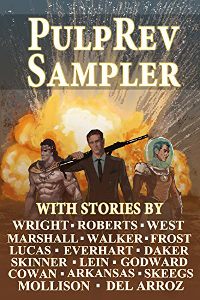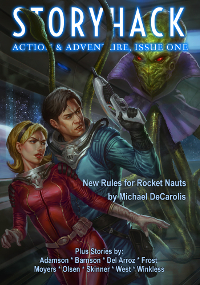Sample the Revolution

I took a very old, tiny idea that had never become the novel I imagined — "A king on the run refuses to abdicate" — and combined that with a little pulpy weirdness, and created The King's Portion.
You can get the sampler by buying it directly for all of 99 cents at Amazon or by signing up for the PulpRev mailing list (details here).
Go, now! Become enjoyified!
P.S. As with StoryHack, it was nice working with the PulpRev folks. If nothing else, the Pulp Revolution does not treat little-known authors with disdain!
And Give My Story a Read
Monday, October 30, 2017 8:40 am

I took a very old, tiny idea that had never become the novel I imagined — "A king on the run refuses to abdicate" — and combined that with a little pulpy weirdness, and created The King's Portion.
You can get the sampler by buying it directly for all of 99 cents at Amazon or by signing up for the PulpRev mailing list (details here).
Go, now! Become enjoyified!
P.S. As with StoryHack, it was nice working with the PulpRev folks. If nothing else, the Pulp Revolution does not treat little-known authors with disdain!
Why the Pulp Attitude Has Attracted Me
On Becoming a Fellow Traveler
Tuesday, September 26, 2017 10:09 am
You can be shaped by what you will not do. I will not drink. I will not curse. I will not lose my temper. Exclude the vices and you become other than vicious.
But “other than” is not enough. The bad is a privation of the good; but the good is not a privation of the bad. You must also be shaped by what you do. Include the virtues and you become virtuous.
We all know science fiction has become vicious. It is a platform for despising God, truth, men, women, and civilization. It gathers the mentally disordered and celebrates their diverse disorders. I just want to read about the defeat of killer robots and instead I must read about six-way sex on the planet Luvwyns.
But “other than” is not enough. The bad is a privation of the good; but the good is not a privation of the bad. You must also be shaped by what you do. Include the virtues and you become virtuous.
We all know science fiction has become vicious. It is a platform for despising God, truth, men, women, and civilization. It gathers the mentally disordered and celebrates their diverse disorders. I just want to read about the defeat of killer robots and instead I must read about six-way sex on the planet Luvwyns.
StoryHack #1 Is Out

Anyhow, StoryHack #1 is out. Buy it on Amazon (to give the publisher money). Review it on Amazon (to increase its rank). Read my story Some Things Missing From Her Profile and be amazed by my superlativiosity. Go, now!
P.S. It's awesome to be in the inaugural issue. Yes, there was a proof-of-concept issue #0, but being in #1 feels nice.
Read My Story in It!
Tuesday, September 26, 2017 9:45 am

Anyhow, StoryHack #1 is out. Buy it on Amazon (to give the publisher money). Review it on Amazon (to increase its rank). Read my story Some Things Missing From Her Profile and be amazed by my superlativiosity. Go, now!
P.S. It's awesome to be in the inaugural issue. Yes, there was a proof-of-concept issue #0, but being in #1 feels nice.
Peekaboo
Added to the Library at Speculative Faith
Sunday, January 15, 2017 2:25 pm
My book The Giant's Walk has been added to the library at Speculative Faith. Click here. For the time being, at least, my book is also showing up (with others) on their front page. I invited myself to their library, but they have been kind enough to let me in. Thank you, Speculative Faith.
Do It Again, Do It Again!
Who Doesn't Like a Series?
Wednesday, January 4, 2017 1:45 pm
There's a lot of advice regarding self-publishing. Much of it involves leveraging Facebook or Twitter or writers' conferences and forums; networking, as it were. I am incompetent at networking. I am generally incompetent at peopling. But one bit of advice I can take is to create a series.
I tend not to make separate works that involve the same characters or worlds. I did write several short stories involving Pugnacious Footefake, but those together barely constitute a single book. The idea, rather, is to offer several related books.
I tend not to make separate works that involve the same characters or worlds. I did write several short stories involving Pugnacious Footefake, but those together barely constitute a single book. The idea, rather, is to offer several related books.
How Quaint Your Tale!
Already a Period Piece?
Sunday, January 1, 2017 1:29 pm
"Aggressively self-promoting" does not describe me. I have made a few bold moves in my writing career (one of which paid off), but I have never been guilty of dogged legwork on my own behalf. My works therefore tend to age, unread.
I have recently retired from my day job. I am still young enough (and not in the self-delusional sense of 60-is-the-new-40) that I now have more than enough time to work a lot harder at getting myself either noticed or traditionally published.
I thought of trying, yet again, to get Noah, Penny published by someone other than myself. Then I reviewed the story in my mind. I realized that it is dated. No cellphones; no texting; no TV on demand; no internet at all. Not one of the characters — all of them in the eighth grade — makes any reference to social media. And how could they? The book was written in the mid-'90s.
I have recently retired from my day job. I am still young enough (and not in the self-delusional sense of 60-is-the-new-40) that I now have more than enough time to work a lot harder at getting myself either noticed or traditionally published.
I thought of trying, yet again, to get Noah, Penny published by someone other than myself. Then I reviewed the story in my mind. I realized that it is dated. No cellphones; no texting; no TV on demand; no internet at all. Not one of the characters — all of them in the eighth grade — makes any reference to social media. And how could they? The book was written in the mid-'90s.
Jane Austen Tells It
Looks Like She Skipped Creative Writing 101
Sunday, October 10, 2004 7:30 pm
As I will surely say again, I object to creative-writing classes. I object to the notion that there is anything to be taught. To learn, perhaps, from accomplished example; but to be taught abstractly from contrived example?
I especially object to the notion that there are any rules of writing. Rules of language, yes, of grammar, of standard usage; but not of writing. "Rules" of writing tend only to mislead novices. The goal is good writing and, truly, good writing is discerned in the unique event. If a story works, it works. One can see patterns in good writing, I suppose; or better yet, patterns in bad writing; but the distillation of "rules" is misguided.
I especially object to the notion that there are any rules of writing. Rules of language, yes, of grammar, of standard usage; but not of writing. "Rules" of writing tend only to mislead novices. The goal is good writing and, truly, good writing is discerned in the unique event. If a story works, it works. One can see patterns in good writing, I suppose; or better yet, patterns in bad writing; but the distillation of "rules" is misguided.
© 2004-25 David Skinner · All rights reserved